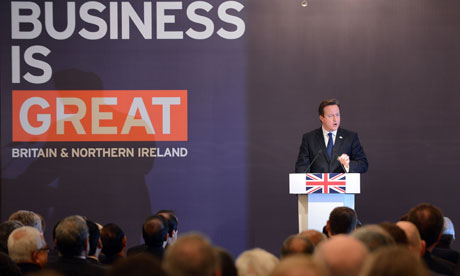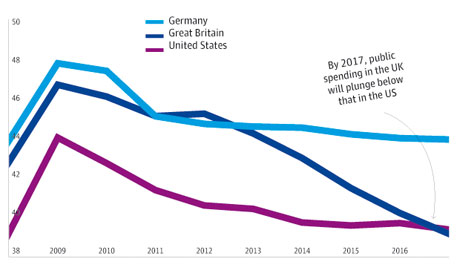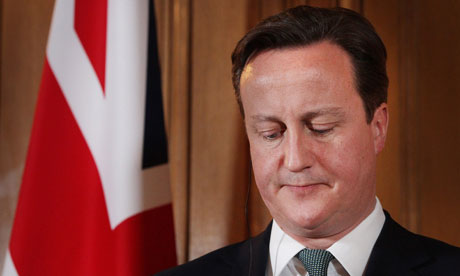David Cameron's welcome mat to 'hardworking' Indians contrasts with attitudes towards the new EU entrants

David Cameron speaks at a business seminar in Mumbai on February 18. Photograph: Indranil Mukherjee/AFP/Getty Images
In The End of Tolerance,
Arun Kundnani argues that the ability to integrate in today's Britain
is based less on how you look and more on whether or not you are deemed
culturally compatible. This may seem like progress but the sliding scale
along which humanity is now organised is not unlike the racial
hierarchies of old; it's just less colour-coded. So, an English-educated
Indian professional may be more acceptable than a white, jobless
Bulgarian or Romanian. This is exactly on point as we witness David Cameron's rush to India, a country whose economic rise he described as "one of the great phenomena of the century".
Cameron and his entourage of CEOs and vice-chancellors will undoubtedly speed past the slums rapidly being cleared for the shiny new malls being built on every spare inch of India's major cities. The majority of Indians – arguably worse off since the advent of neoliberalism in the "largest democracy" – are not who Cameron has in mind when he talks about unleashing "India's potential".
Back in the UK, the imminent arrival of Bulgarians and Romanians with new EU rights is being painted as a make or break electoral issue. They are the victims of a "xeno-racism" that holds impoverished strangers, including whites, in its sight. In contrast, Indian students with the cash to pay premium fees to study at British universities will, according to Cameron, have the red carpet rolled out and will not, he has claimed, be subject to limits on how long they can stay and work. How such "positive discrimination" will be justified in light of the Tories' commitment to a cap on immigration in the tens of thousands per year remains to be seen.
Cultural stereotypes abound. Indians – not Pakistanis mind – are deemed hardworking and resourceful with infinite admiration for the UK and its traditions. Colonialism is rewritten as a "special relationship". Indians (Hindus) assimilate into the British way of life, speak English, and are religious moderates. They are not a drain, rather an opportunity for investment in an ailing British economy.
Romanians and Bulgarians, on the other hand, are today's "wretched of the earth", described by Trevor Kavanagh in The Sun as variably corrupt, as rapists and as pickpockets. The Tories will lose the Eastleigh byelection, he warns, unless the government puts its foot down and refuses to grant full EU rights to Romanian and Bulgarian citizens before they descend on the UK.
The comparison of Cameron's rhetoric on India and Britain's newest EU partners reveals how, on the surface at least, racism is so often influenced by economics. The successful are pitted against the scroungers, no matter the extent to which either stereotype holds water. Immigration with a capital "I" – as a headline rather than a life experience – has always needed heroes and villains, those who gave versus those who took, those who built versus those who destroyed. Racism works to attach these apparently natural attributes to whole groups of people and that is why it is never detachable from the immigration "debate". This is the message that Cameron is sending: we will tolerate those who can benefit us, but not those who fail to make us prosper.
Indians are no more universally assimilable than south-eastern Europeans are detrimental to the UK. Indeed, the opposite was once deemed to be the case when skin colour, rather than cultural compatibility, influenced migration policy more explicitly and arrivals from the east were dissidents, not purported social security hunters. Only when we decouple immigration from race will the arbitrariness of the ranking of populations according to profitability become apparent and racial generalisations – positive or negative – be shown up for the poverty of the ideas that lie beneath them.
Cameron and his entourage of CEOs and vice-chancellors will undoubtedly speed past the slums rapidly being cleared for the shiny new malls being built on every spare inch of India's major cities. The majority of Indians – arguably worse off since the advent of neoliberalism in the "largest democracy" – are not who Cameron has in mind when he talks about unleashing "India's potential".
Back in the UK, the imminent arrival of Bulgarians and Romanians with new EU rights is being painted as a make or break electoral issue. They are the victims of a "xeno-racism" that holds impoverished strangers, including whites, in its sight. In contrast, Indian students with the cash to pay premium fees to study at British universities will, according to Cameron, have the red carpet rolled out and will not, he has claimed, be subject to limits on how long they can stay and work. How such "positive discrimination" will be justified in light of the Tories' commitment to a cap on immigration in the tens of thousands per year remains to be seen.
Cultural stereotypes abound. Indians – not Pakistanis mind – are deemed hardworking and resourceful with infinite admiration for the UK and its traditions. Colonialism is rewritten as a "special relationship". Indians (Hindus) assimilate into the British way of life, speak English, and are religious moderates. They are not a drain, rather an opportunity for investment in an ailing British economy.
Romanians and Bulgarians, on the other hand, are today's "wretched of the earth", described by Trevor Kavanagh in The Sun as variably corrupt, as rapists and as pickpockets. The Tories will lose the Eastleigh byelection, he warns, unless the government puts its foot down and refuses to grant full EU rights to Romanian and Bulgarian citizens before they descend on the UK.
The comparison of Cameron's rhetoric on India and Britain's newest EU partners reveals how, on the surface at least, racism is so often influenced by economics. The successful are pitted against the scroungers, no matter the extent to which either stereotype holds water. Immigration with a capital "I" – as a headline rather than a life experience – has always needed heroes and villains, those who gave versus those who took, those who built versus those who destroyed. Racism works to attach these apparently natural attributes to whole groups of people and that is why it is never detachable from the immigration "debate". This is the message that Cameron is sending: we will tolerate those who can benefit us, but not those who fail to make us prosper.
Indians are no more universally assimilable than south-eastern Europeans are detrimental to the UK. Indeed, the opposite was once deemed to be the case when skin colour, rather than cultural compatibility, influenced migration policy more explicitly and arrivals from the east were dissidents, not purported social security hunters. Only when we decouple immigration from race will the arbitrariness of the ranking of populations according to profitability become apparent and racial generalisations – positive or negative – be shown up for the poverty of the ideas that lie beneath them.






